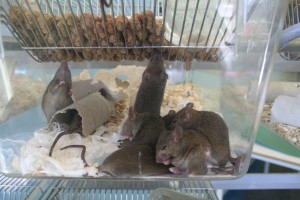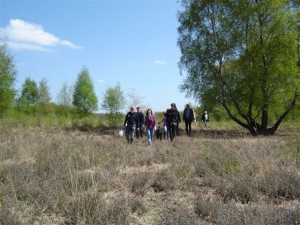Weltlog Woche 21 – 2013
Grossartig, wir konnten fast 100.000 m2 der gefährdetsten Natur auf der Auktion der Staatsforstverwaltung freikaufen! In 2,5 Wochen haben wir eine viertel Million Euro einsammeln können, nur durch Aufrufe in den sozialen Medien, im Radio und durch die Unterstützung des Radioprogramms „Vroege Vogels“ (Frühe Vögel) und unserer eigenen Mitglieder. Damit haben wir die gefährdetsten Naturwerte vor dem Markt geschützt. Soweit wir Wissen ist dies die grösste Bürgerinitiative im Bereich des Naturankaufes die es jemals gegeben hat. Mehr Informationen über die Naturauktion und unsere Aktion können Sie in den Worldlogs der vergangenen zwei Wochen nachlesen.
Ich bin sehr froh, dass sich so viele Naturschützer hinter diese positive Aktion gestellt haben um die gefährdete Natur zu retten. Die Tatsache, dass wir in so kurzer Zeit so viel Geld einsammeln konnten verdeutlicht wie sehr der Abbau der Natur den Menschen ans Herz geht. Die Partei für die Tiere wird sich übrigens weiter, innerhalb wie ausserhalb des Parlaments, gegen den weiteren Ausverkauf der Natur einsetzen. Eine Regierung die deutlich macht, die Natur nicht höher einzuschätzen als den Preis des Bodens, kennt offenbar den Preis aber nicht den Wert der Natur. Dieses Zitat von John Sawhill trifft es eindeutig: A society is defined not only by what it creates, but by what it refuses to destroy.
Obwohl wir auf eine Anzahl Gebiete das höchste Gebot abgegeben haben, ist es leider noch nicht sicher, dass die Partei die Natur auch tatsächlich erwirbt. Der jetzige Besitzer, die Staatsforstverwaltung, muss dem neuen Besitzer die Naturgebiete „gönnen“. Diese Phase dauert bis zum 24. Mai. Fortsetzung folgt also!
Vergangene Woche habe ich in der Debatte über Tierversuche den Staatssekretär für Wirtschaftsfragen gefragt um zusammen mit der Industrie, der akademischen Welt und den Bildungsorganisationen in Alternativen für Tierversuchen zu investieren. Das Forschungsinstitut YonMW machte zuvor deutlich, dass bis 2025 der Gebrauch von Tierversuchen um 40% verringert werden kann und damit die Qualität des Gesundheitswesen verbessert und mehr Beschäftigung ermöglicht wird.
Die neuesten Zahlen zeigen, dass die Anzahl der Tierversuche in den Niederlanden in 2011 um 2,5 Prozent gestiegen ist. In dem Jahr gab es in den Niederlanden gut eine halbe Million Versuchstiere und wurden 589.853 Experimente mit lebenden Tieren durchgeführt. Ausserdem wurden noch mal eine halbe Million Tiere in Tierversuchslaboren getötet, weil diese, nachdem sie gezüchtet wurden, nicht den Auswahlkriterien für einen Tierversuch entsprachen.
Es gibt allen Grund auf tierversuchsfreie Techniken zu setzen. Tiere sind keine Menschen. Von allen Medikamenten die mit Hilfe von Tierversuchen entwickelt wurden, werden immer noch etwa 90 Prozent abgelehnt nachdem sie in klinischen Tests an Menschen ausprobiert wurden. Effektivere Behandelmethoden erfordern neue Modelle. Lasst uns darauf setzen, im Interesse der Menschen und der Tiere.
Obwohl die Niederlande vom vierten auf den zehnten Platz gefallen ist, stehen wir immer noch in den Top Ten der Länder, die am grausamsten mit Tieren umgehen. Wir werden weiterhin unser Bestes geben um die Niederlande hier raus zu kriegen!
Und wissen Sie was ein Hamburger wirklich kostet? Sehen Sie diesen Film und entdecken Sie alle verborgenen Kosten die in einen Hamburger stecken.
Wieder grossartige Bilder bei The Big Picture von The Boston Globe! Diesmal eine Fotoreportage der National Geographic Traveler 2013.
Bis nächste Woche, Marianne
Wonderful! We managed to buy the freedom of almost 100,000 square meters of the most vulnerable nature at the auction of Staatsbosbeheer! In 2.5 weeks’ time, we managed to raise a quarter of a million Euros by social media calls, radio spots and support from the radio show Early Birds, and our own members. By doing so we are protecting the most vulnerable nature values against the market. As far as we know, it was the biggest citizens’ initiative ever to buy nature. More information about the nature auction and our action can be found in my Wordlogs of the past two weeks.
I am really pleased that so many nature protectors supported our positive action to save the weak plots of nature. The fact that we managed to raise so much money in such a short time shows that people are concerned about the deterioration of nature. But the Party for the Animals will continue to oppose to the further sale of nature, inside and outside Parliament. A government that shows not to value nature more than the price of the ground it is on, is obviously a government that knows the price but not the value of nature. The great quote by John Sawhill fully applies to this case: A society is defined not only by what it creates, but by what it refuses to destroy.
Being the highest bidder is unfortunately no guarantee that the Party will actually obtain the plots of nature. After the descending price process at the auction, the awarding process is on until the 24th of May. The current owner, the National Forest Service, has to award the plots to the new owner. To be continued!
In the debate about animal testing last week, I asked the State Secretary of Economic Affairs to jointly invest with the industrial sector, academic world, education and social organisations in finding alternatives for animal testing. Research Agency ZonMW recently made clear that the use of test animals can be reduced by 40 per cent in the year 2025, and that the quality of healthcare and the employment will improve as a result.

Most recent figures show that the number of test animals in the Netherlands has risen by 2.5 per cent in 2011. In that year, there were more than one million test animals in the Netherlands and 589,853 experiments were carried out on live animals. In addition to this number of animals, there are another half a million animals that are put down immediately in test animal laboratories, because they, after breeding them, do not meet the selection criteria for a test.
There is every reason to aim for animal test-free technologies. Animals are not humans. Approximately ninety percent of all medicines developed with animal testing drop out when tested on humans by means of clinical trials. New models are needed for more effective treatment methods. Let’s aim for that in the interest of humans and animals.
It’s true that the Netherlands has dropped from the fourth to the tenth place, but we are still in the top 10 of countries that are most cruel to animals. We will continue to do our best to get the Netherlands out of this top 10!
And do you know what the real price is of a hamburger? Watch this short film to discover all the hidden costs of a hamburger.
And again some breathtaking pictures at the Big Picture of The Boston Globe! This time it is a photo report of the National Geographic Traveller 2013.
See you next week, Marianne
